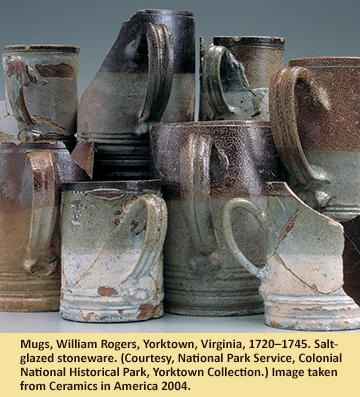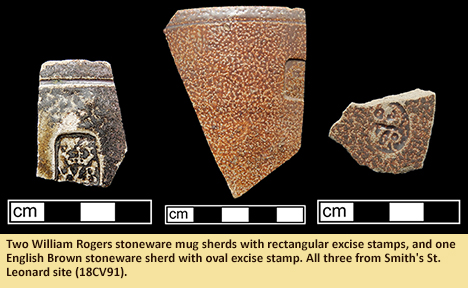Maryland Archaeological Conservation Laboratory
Main_Content
Curator's Choice 2015
Buying Local: 18th-century Chesapeake Stoneware
June 2015
By Alex Glass, Public Archaeology Asst., MAC Lab
 During the 18th century colonial production of commercial goods was limited by the mercantilist policy implemented by the British crown. Despite legislation restricting colonial manufacture for local markets there is evidence of several colonial industries, including ceramic production, for the colonial market.
During the 18th century colonial production of commercial goods was limited by the mercantilist policy implemented by the British crown. Despite legislation restricting colonial manufacture for local markets there is evidence of several colonial industries, including ceramic production, for the colonial market.
One potter of note was William Rogers. Rogers immigrated to the colony of Virginia in 1711 and was granted two lots in Yorktown where he established a brewery (Watkins and Noel Hume 1967:80). By the 1720s Rogers was operating a pottery works in Yorktown (Barka 2004:18). The colonial administration of Virginia knew about Rogers’ business, but in an attempt to downplay Rogers’ success to English authorities he was described as “the poor potter,” suggesting he was neither successful nor producing valuable wares (Watkins and Noel Hume 1967, Barka 2004). Rogers’ kilns produced both earthenware and stoneware ceramics for roughly 25 years, and his wares were “exported to other North American colonies and to perhaps the West Indies” (Barka 2004:31, McCartney and Ayres 2004:49).
At the Smith's St. Leonard site, located at Jefferson Patterson Park and Museum in Maryland, pieces of Rogers’ stoneware have been found in the storehouse cellar and in plowzone. Smith’s St. Leonard was occupied during roughly the same time period as Rogers was producing pottery in Yorktown. Unlike the standard excise mark of “WR” surrounded by an oval cartouche found on British-made pottery, the William Rogers sherds are marked with “WR” in a rectangular enclosure. Excavations at Rogers’ kiln sites have found the rectangular cartouche to be a hallmark of his stoneware vessels (Watkins and Noel Hume 1967:92).
 Rogers’ stoneware at the Smith’s St. Leonard site is an interesting occurrence. Outside of Virginia, it seems uncommon to find William Rogers’ pottery on archaeological sites, yet there is evidence that suggests he was also selling his wares to merchants in Maryland, North Carolina and New England (McCartney and Ayres 2004:54). As of 2015 only two stoneware sherds have been identified from the Smith's St. Leonard site as being made by William Rogers. It is possible that other sherds may represent his work, but have not been recognized. British mercantile policy in the 18th century implies that most of the material culture found on colonial archaeological sites was imported from overseas. However, the presence of Rogers’ ceramics at the Smith’s St. Leonard site indicates a growing colonial independence, and that not all of the colonist’s goods were coming from England.
Rogers’ stoneware at the Smith’s St. Leonard site is an interesting occurrence. Outside of Virginia, it seems uncommon to find William Rogers’ pottery on archaeological sites, yet there is evidence that suggests he was also selling his wares to merchants in Maryland, North Carolina and New England (McCartney and Ayres 2004:54). As of 2015 only two stoneware sherds have been identified from the Smith's St. Leonard site as being made by William Rogers. It is possible that other sherds may represent his work, but have not been recognized. British mercantile policy in the 18th century implies that most of the material culture found on colonial archaeological sites was imported from overseas. However, the presence of Rogers’ ceramics at the Smith’s St. Leonard site indicates a growing colonial independence, and that not all of the colonist’s goods were coming from England.
| References |
|
| Barka, Norman |
| 2004 |
"Archaeology of a Colonial Pottery Factory: The Kilns and Ceramics of the "Poor Potter" of Yorktown". In Ceramics in America. Edited by Robert Hunter, pp. 15-48. Chipstone Foundation, England. |
|
| Collections Database: Five Colleges and Historic Deerfield Museum Consortium. English Mug. Accession Number HD 94.016.4. Electronic Document. |
|
http://museums.fivecolleges.edu/detail.php?museum=&t=objects&type=ext&f=&s=&record=224&earliest_year=1700&op-earliest_year=%3e%3D&latest_year=1725&op-latest_year=%3c%3D, accessed May 29, 2015. |
|
| McCartney, Martha W. and Edward Ayres |
| 2004 |
"Yorktown’s "Poor Potter": A Man Wise Beyond Discretion". In Ceramics in America. Edited by Robert Hunter, pp. 15-48. Chipstone Foundation, England. |
|
| Watkins, Malcolm C. and Ivor Noel Hume |
| 1967 |
The "Poor Potter" of Yorktown. Smithsonian Institution Press. Washington, DC. |
|